Sociology Essay: Understanding Marriage and Family in Singapore
VerifiedAdded on 2023/06/03
|7
|1893
|223
Essay
AI Summary
This sociology essay examines the concepts of marriage and family within the context of Singapore society. It delves into how Singaporeans become parents through various means, including legal marriage, sperm donation, and surrogacy, while also addressing the societal stigmas and legal challenges associated with these practices. The essay specifically focuses on same-sex marriage, highlighting legal crises due to non-recognition by Singaporean law and the social implications of such unions. It explores the views of Singaporeans on same-sex marriage, the influence of cultural norms, religious perspectives, and the pressures from other countries. The analysis includes micro and macro-level approaches to understanding individual behaviors and the broader cultural context, concluding with a discussion on the importance of considering cultural values and the potential challenges faced by homogenous families, emphasizing the role of institutions like courts and parliament in addressing these issues.

Running head: SOCIOLOGY
Sociology
Name
ID
Course
Unit
Lecturer
Date
Sociology
Name
ID
Course
Unit
Lecturer
Date
Paraphrase This Document
Need a fresh take? Get an instant paraphrase of this document with our AI Paraphraser
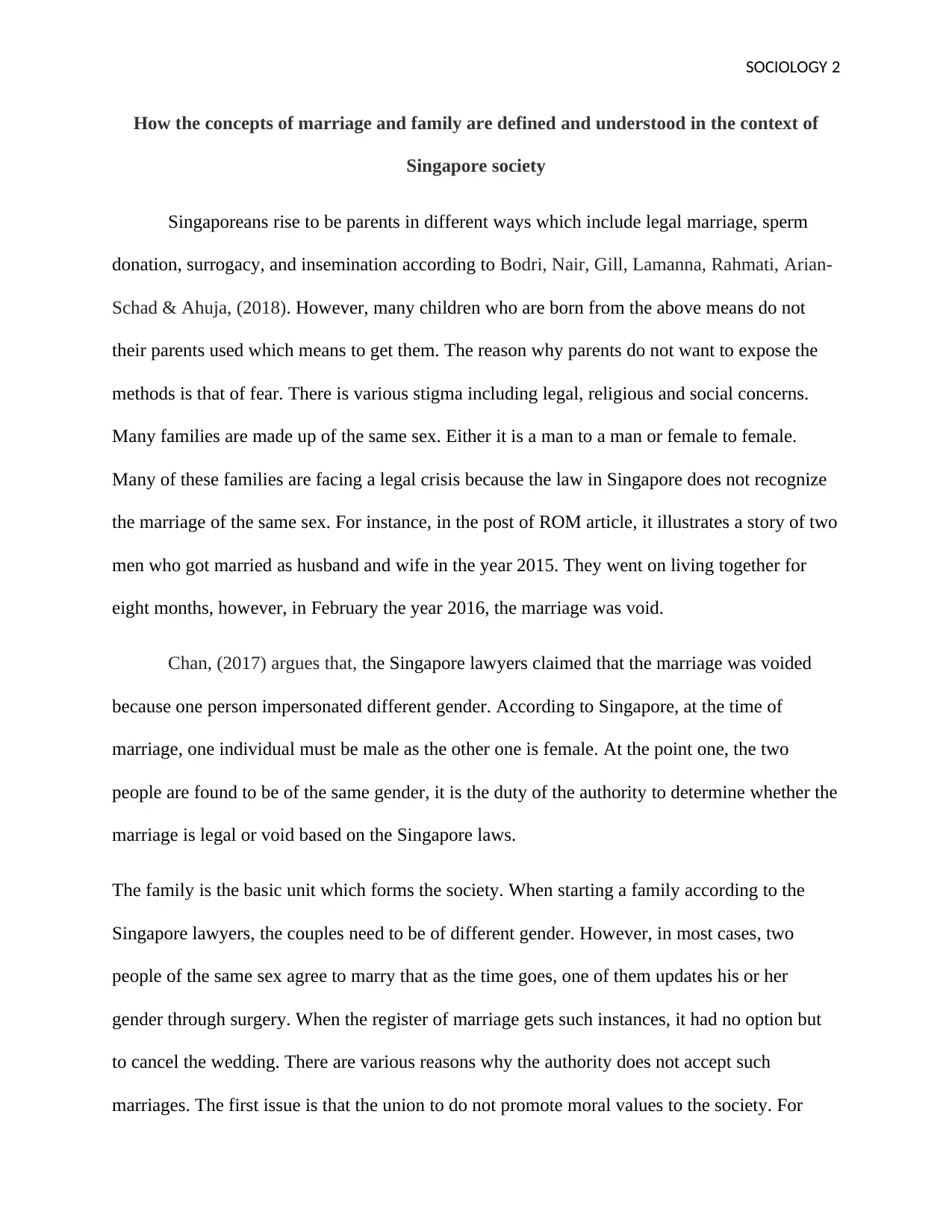
SOCIOLOGY 2
How the concepts of marriage and family are defined and understood in the context of
Singapore society
Singaporeans rise to be parents in different ways which include legal marriage, sperm
donation, surrogacy, and insemination according to Bodri, Nair, Gill, Lamanna, Rahmati, Arian-
Schad & Ahuja, (2018). However, many children who are born from the above means do not
their parents used which means to get them. The reason why parents do not want to expose the
methods is that of fear. There is various stigma including legal, religious and social concerns.
Many families are made up of the same sex. Either it is a man to a man or female to female.
Many of these families are facing a legal crisis because the law in Singapore does not recognize
the marriage of the same sex. For instance, in the post of ROM article, it illustrates a story of two
men who got married as husband and wife in the year 2015. They went on living together for
eight months, however, in February the year 2016, the marriage was void.
Chan, (2017) argues that, the Singapore lawyers claimed that the marriage was voided
because one person impersonated different gender. According to Singapore, at the time of
marriage, one individual must be male as the other one is female. At the point one, the two
people are found to be of the same gender, it is the duty of the authority to determine whether the
marriage is legal or void based on the Singapore laws.
The family is the basic unit which forms the society. When starting a family according to the
Singapore lawyers, the couples need to be of different gender. However, in most cases, two
people of the same sex agree to marry that as the time goes, one of them updates his or her
gender through surgery. When the register of marriage gets such instances, it had no option but
to cancel the wedding. There are various reasons why the authority does not accept such
marriages. The first issue is that the union to do not promote moral values to the society. For
How the concepts of marriage and family are defined and understood in the context of
Singapore society
Singaporeans rise to be parents in different ways which include legal marriage, sperm
donation, surrogacy, and insemination according to Bodri, Nair, Gill, Lamanna, Rahmati, Arian-
Schad & Ahuja, (2018). However, many children who are born from the above means do not
their parents used which means to get them. The reason why parents do not want to expose the
methods is that of fear. There is various stigma including legal, religious and social concerns.
Many families are made up of the same sex. Either it is a man to a man or female to female.
Many of these families are facing a legal crisis because the law in Singapore does not recognize
the marriage of the same sex. For instance, in the post of ROM article, it illustrates a story of two
men who got married as husband and wife in the year 2015. They went on living together for
eight months, however, in February the year 2016, the marriage was void.
Chan, (2017) argues that, the Singapore lawyers claimed that the marriage was voided
because one person impersonated different gender. According to Singapore, at the time of
marriage, one individual must be male as the other one is female. At the point one, the two
people are found to be of the same gender, it is the duty of the authority to determine whether the
marriage is legal or void based on the Singapore laws.
The family is the basic unit which forms the society. When starting a family according to the
Singapore lawyers, the couples need to be of different gender. However, in most cases, two
people of the same sex agree to marry that as the time goes, one of them updates his or her
gender through surgery. When the register of marriage gets such instances, it had no option but
to cancel the wedding. There are various reasons why the authority does not accept such
marriages. The first issue is that the union to do not promote moral values to the society. For
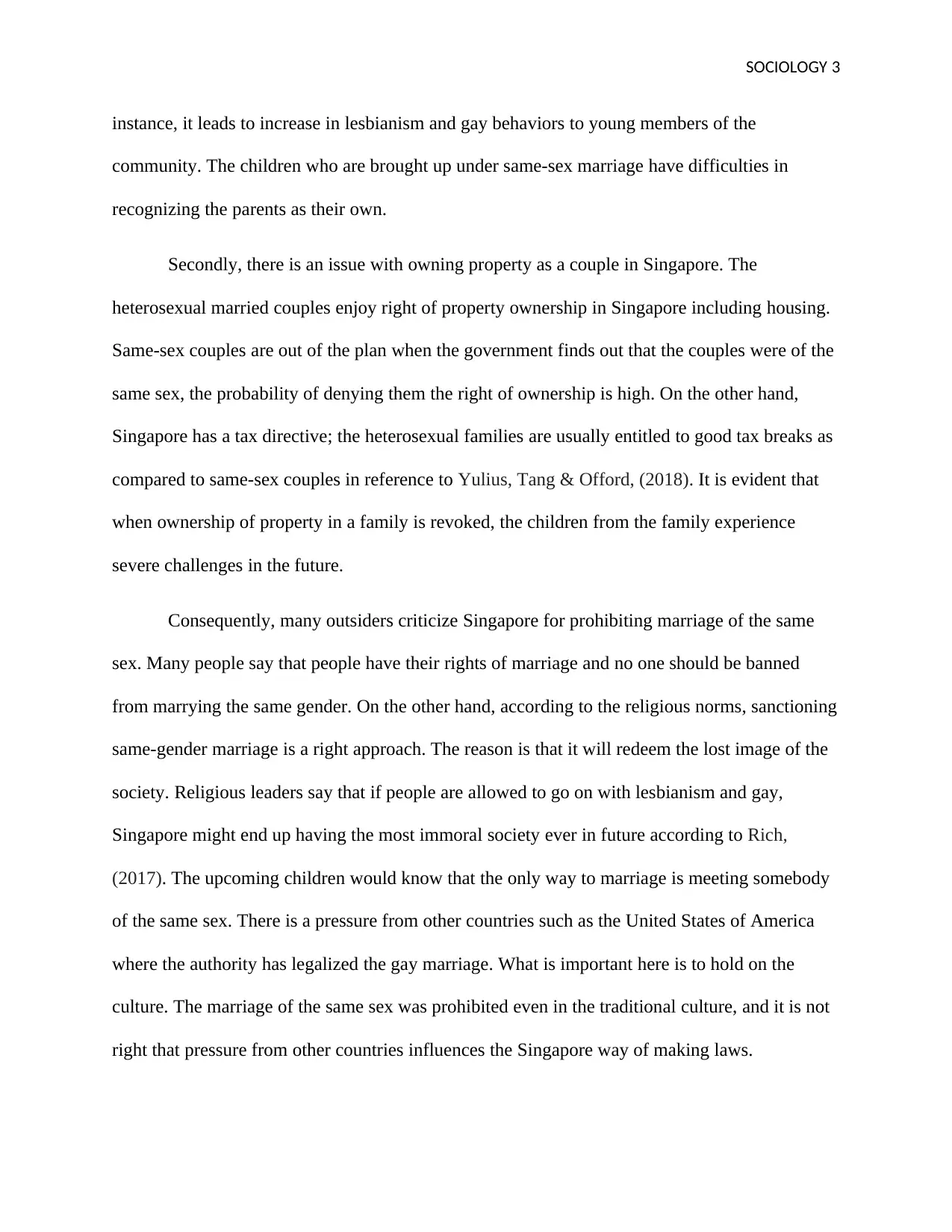
SOCIOLOGY 3
instance, it leads to increase in lesbianism and gay behaviors to young members of the
community. The children who are brought up under same-sex marriage have difficulties in
recognizing the parents as their own.
Secondly, there is an issue with owning property as a couple in Singapore. The
heterosexual married couples enjoy right of property ownership in Singapore including housing.
Same-sex couples are out of the plan when the government finds out that the couples were of the
same sex, the probability of denying them the right of ownership is high. On the other hand,
Singapore has a tax directive; the heterosexual families are usually entitled to good tax breaks as
compared to same-sex couples in reference to Yulius, Tang & Offord, (2018). It is evident that
when ownership of property in a family is revoked, the children from the family experience
severe challenges in the future.
Consequently, many outsiders criticize Singapore for prohibiting marriage of the same
sex. Many people say that people have their rights of marriage and no one should be banned
from marrying the same gender. On the other hand, according to the religious norms, sanctioning
same-gender marriage is a right approach. The reason is that it will redeem the lost image of the
society. Religious leaders say that if people are allowed to go on with lesbianism and gay,
Singapore might end up having the most immoral society ever in future according to Rich,
(2017). The upcoming children would know that the only way to marriage is meeting somebody
of the same sex. There is a pressure from other countries such as the United States of America
where the authority has legalized the gay marriage. What is important here is to hold on the
culture. The marriage of the same sex was prohibited even in the traditional culture, and it is not
right that pressure from other countries influences the Singapore way of making laws.
instance, it leads to increase in lesbianism and gay behaviors to young members of the
community. The children who are brought up under same-sex marriage have difficulties in
recognizing the parents as their own.
Secondly, there is an issue with owning property as a couple in Singapore. The
heterosexual married couples enjoy right of property ownership in Singapore including housing.
Same-sex couples are out of the plan when the government finds out that the couples were of the
same sex, the probability of denying them the right of ownership is high. On the other hand,
Singapore has a tax directive; the heterosexual families are usually entitled to good tax breaks as
compared to same-sex couples in reference to Yulius, Tang & Offord, (2018). It is evident that
when ownership of property in a family is revoked, the children from the family experience
severe challenges in the future.
Consequently, many outsiders criticize Singapore for prohibiting marriage of the same
sex. Many people say that people have their rights of marriage and no one should be banned
from marrying the same gender. On the other hand, according to the religious norms, sanctioning
same-gender marriage is a right approach. The reason is that it will redeem the lost image of the
society. Religious leaders say that if people are allowed to go on with lesbianism and gay,
Singapore might end up having the most immoral society ever in future according to Rich,
(2017). The upcoming children would know that the only way to marriage is meeting somebody
of the same sex. There is a pressure from other countries such as the United States of America
where the authority has legalized the gay marriage. What is important here is to hold on the
culture. The marriage of the same sex was prohibited even in the traditional culture, and it is not
right that pressure from other countries influences the Singapore way of making laws.
⊘ This is a preview!⊘
Do you want full access?
Subscribe today to unlock all pages.

Trusted by 1+ million students worldwide
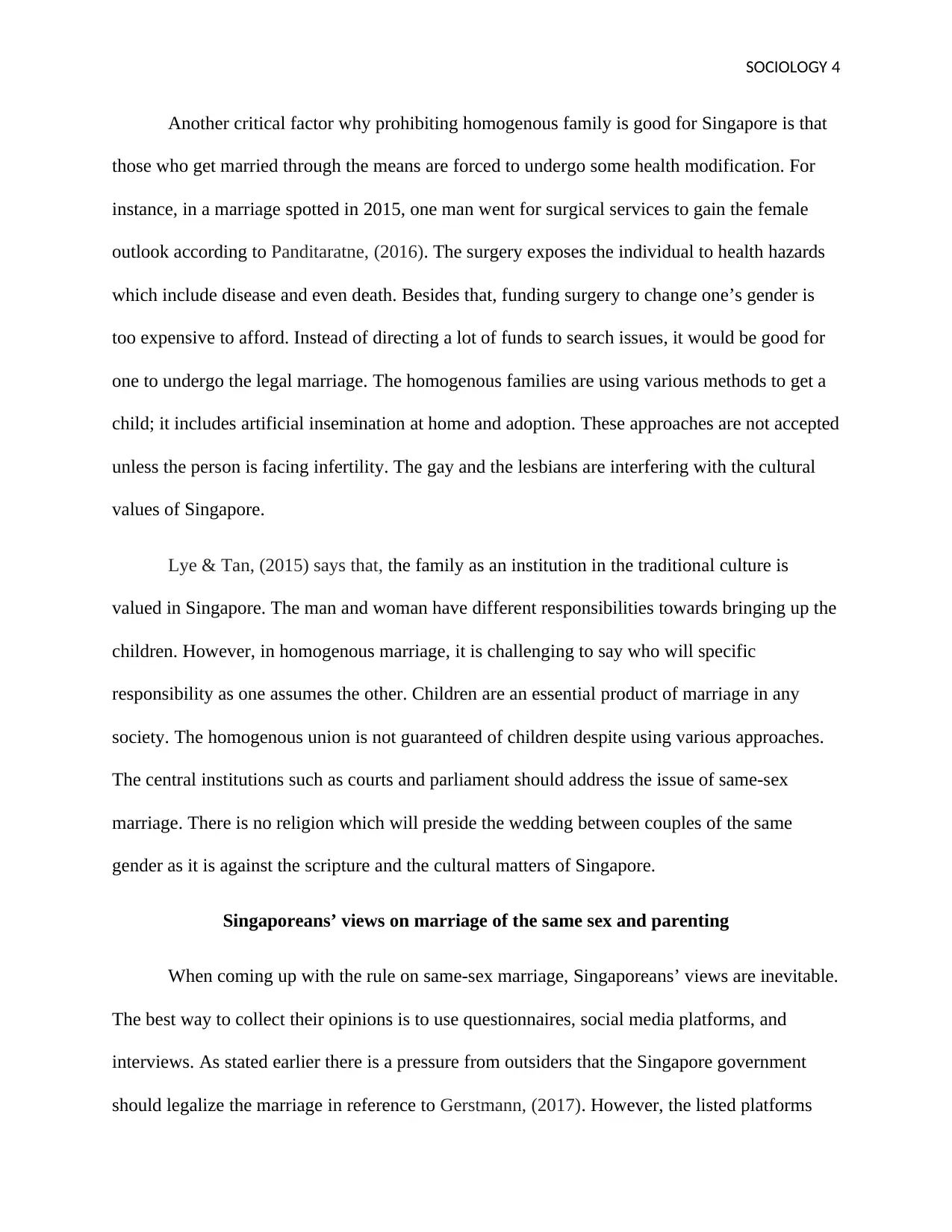
SOCIOLOGY 4
Another critical factor why prohibiting homogenous family is good for Singapore is that
those who get married through the means are forced to undergo some health modification. For
instance, in a marriage spotted in 2015, one man went for surgical services to gain the female
outlook according to Panditaratne, (2016). The surgery exposes the individual to health hazards
which include disease and even death. Besides that, funding surgery to change one’s gender is
too expensive to afford. Instead of directing a lot of funds to search issues, it would be good for
one to undergo the legal marriage. The homogenous families are using various methods to get a
child; it includes artificial insemination at home and adoption. These approaches are not accepted
unless the person is facing infertility. The gay and the lesbians are interfering with the cultural
values of Singapore.
Lye & Tan, (2015) says that, the family as an institution in the traditional culture is
valued in Singapore. The man and woman have different responsibilities towards bringing up the
children. However, in homogenous marriage, it is challenging to say who will specific
responsibility as one assumes the other. Children are an essential product of marriage in any
society. The homogenous union is not guaranteed of children despite using various approaches.
The central institutions such as courts and parliament should address the issue of same-sex
marriage. There is no religion which will preside the wedding between couples of the same
gender as it is against the scripture and the cultural matters of Singapore.
Singaporeans’ views on marriage of the same sex and parenting
When coming up with the rule on same-sex marriage, Singaporeans’ views are inevitable.
The best way to collect their opinions is to use questionnaires, social media platforms, and
interviews. As stated earlier there is a pressure from outsiders that the Singapore government
should legalize the marriage in reference to Gerstmann, (2017). However, the listed platforms
Another critical factor why prohibiting homogenous family is good for Singapore is that
those who get married through the means are forced to undergo some health modification. For
instance, in a marriage spotted in 2015, one man went for surgical services to gain the female
outlook according to Panditaratne, (2016). The surgery exposes the individual to health hazards
which include disease and even death. Besides that, funding surgery to change one’s gender is
too expensive to afford. Instead of directing a lot of funds to search issues, it would be good for
one to undergo the legal marriage. The homogenous families are using various methods to get a
child; it includes artificial insemination at home and adoption. These approaches are not accepted
unless the person is facing infertility. The gay and the lesbians are interfering with the cultural
values of Singapore.
Lye & Tan, (2015) says that, the family as an institution in the traditional culture is
valued in Singapore. The man and woman have different responsibilities towards bringing up the
children. However, in homogenous marriage, it is challenging to say who will specific
responsibility as one assumes the other. Children are an essential product of marriage in any
society. The homogenous union is not guaranteed of children despite using various approaches.
The central institutions such as courts and parliament should address the issue of same-sex
marriage. There is no religion which will preside the wedding between couples of the same
gender as it is against the scripture and the cultural matters of Singapore.
Singaporeans’ views on marriage of the same sex and parenting
When coming up with the rule on same-sex marriage, Singaporeans’ views are inevitable.
The best way to collect their opinions is to use questionnaires, social media platforms, and
interviews. As stated earlier there is a pressure from outsiders that the Singapore government
should legalize the marriage in reference to Gerstmann, (2017). However, the listed platforms
Paraphrase This Document
Need a fresh take? Get an instant paraphrase of this document with our AI Paraphraser
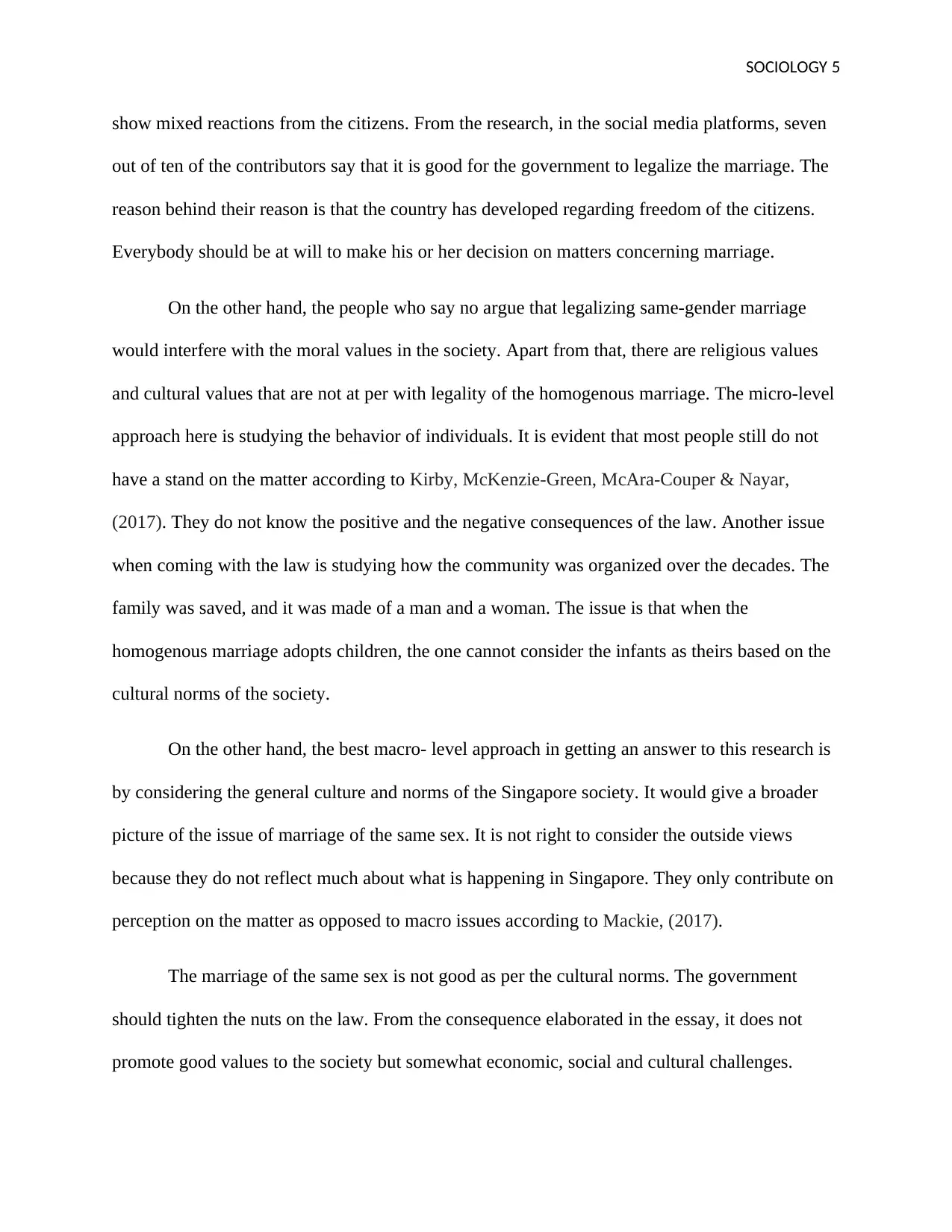
SOCIOLOGY 5
show mixed reactions from the citizens. From the research, in the social media platforms, seven
out of ten of the contributors say that it is good for the government to legalize the marriage. The
reason behind their reason is that the country has developed regarding freedom of the citizens.
Everybody should be at will to make his or her decision on matters concerning marriage.
On the other hand, the people who say no argue that legalizing same-gender marriage
would interfere with the moral values in the society. Apart from that, there are religious values
and cultural values that are not at per with legality of the homogenous marriage. The micro-level
approach here is studying the behavior of individuals. It is evident that most people still do not
have a stand on the matter according to Kirby, McKenzie-Green, McAra-Couper & Nayar,
(2017). They do not know the positive and the negative consequences of the law. Another issue
when coming with the law is studying how the community was organized over the decades. The
family was saved, and it was made of a man and a woman. The issue is that when the
homogenous marriage adopts children, the one cannot consider the infants as theirs based on the
cultural norms of the society.
On the other hand, the best macro- level approach in getting an answer to this research is
by considering the general culture and norms of the Singapore society. It would give a broader
picture of the issue of marriage of the same sex. It is not right to consider the outside views
because they do not reflect much about what is happening in Singapore. They only contribute on
perception on the matter as opposed to macro issues according to Mackie, (2017).
The marriage of the same sex is not good as per the cultural norms. The government
should tighten the nuts on the law. From the consequence elaborated in the essay, it does not
promote good values to the society but somewhat economic, social and cultural challenges.
show mixed reactions from the citizens. From the research, in the social media platforms, seven
out of ten of the contributors say that it is good for the government to legalize the marriage. The
reason behind their reason is that the country has developed regarding freedom of the citizens.
Everybody should be at will to make his or her decision on matters concerning marriage.
On the other hand, the people who say no argue that legalizing same-gender marriage
would interfere with the moral values in the society. Apart from that, there are religious values
and cultural values that are not at per with legality of the homogenous marriage. The micro-level
approach here is studying the behavior of individuals. It is evident that most people still do not
have a stand on the matter according to Kirby, McKenzie-Green, McAra-Couper & Nayar,
(2017). They do not know the positive and the negative consequences of the law. Another issue
when coming with the law is studying how the community was organized over the decades. The
family was saved, and it was made of a man and a woman. The issue is that when the
homogenous marriage adopts children, the one cannot consider the infants as theirs based on the
cultural norms of the society.
On the other hand, the best macro- level approach in getting an answer to this research is
by considering the general culture and norms of the Singapore society. It would give a broader
picture of the issue of marriage of the same sex. It is not right to consider the outside views
because they do not reflect much about what is happening in Singapore. They only contribute on
perception on the matter as opposed to macro issues according to Mackie, (2017).
The marriage of the same sex is not good as per the cultural norms. The government
should tighten the nuts on the law. From the consequence elaborated in the essay, it does not
promote good values to the society but somewhat economic, social and cultural challenges.
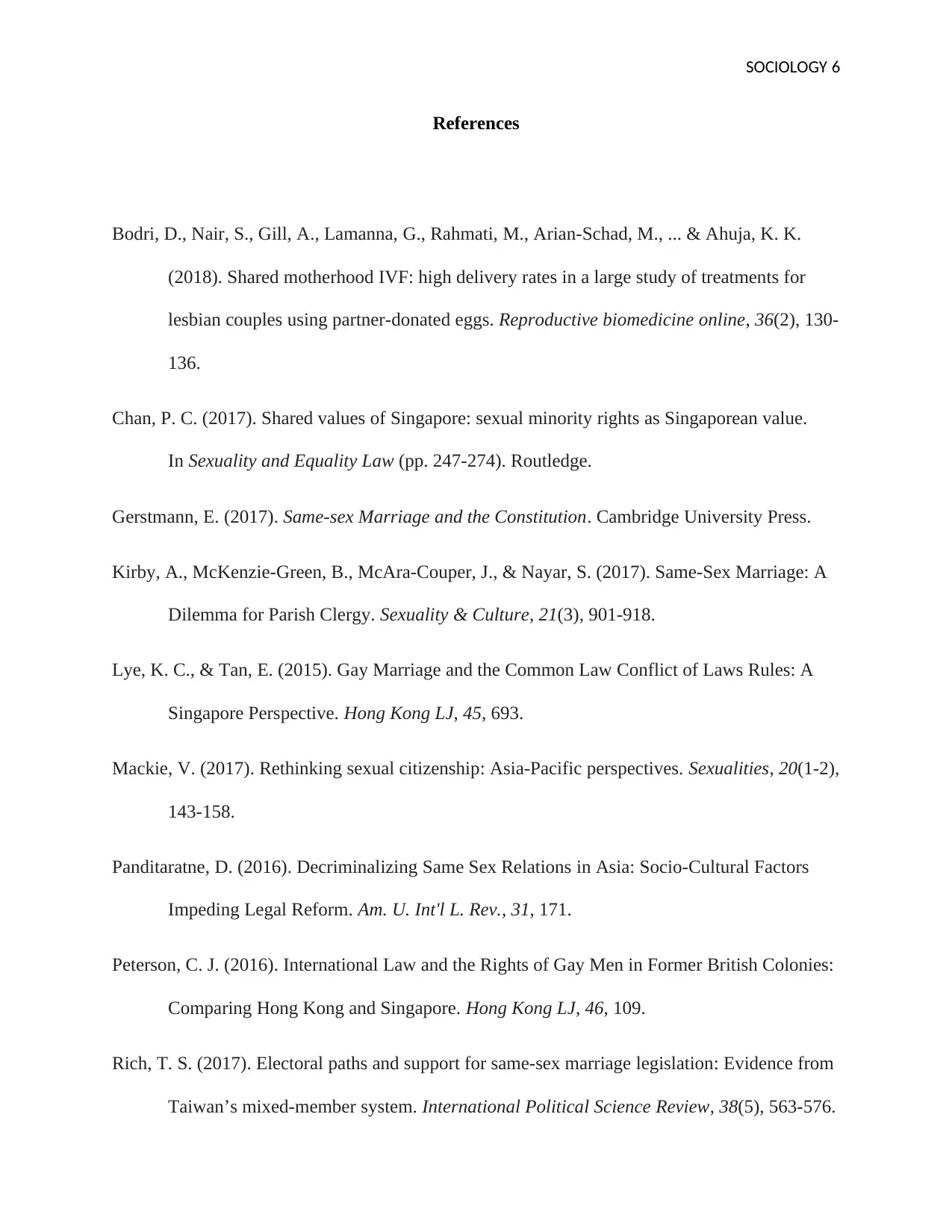
SOCIOLOGY 6
References
Bodri, D., Nair, S., Gill, A., Lamanna, G., Rahmati, M., Arian-Schad, M., ... & Ahuja, K. K.
(2018). Shared motherhood IVF: high delivery rates in a large study of treatments for
lesbian couples using partner-donated eggs. Reproductive biomedicine online, 36(2), 130-
136.
Chan, P. C. (2017). Shared values of Singapore: sexual minority rights as Singaporean value.
In Sexuality and Equality Law (pp. 247-274). Routledge.
Gerstmann, E. (2017). Same-sex Marriage and the Constitution. Cambridge University Press.
Kirby, A., McKenzie-Green, B., McAra-Couper, J., & Nayar, S. (2017). Same-Sex Marriage: A
Dilemma for Parish Clergy. Sexuality & Culture, 21(3), 901-918.
Lye, K. C., & Tan, E. (2015). Gay Marriage and the Common Law Conflict of Laws Rules: A
Singapore Perspective. Hong Kong LJ, 45, 693.
Mackie, V. (2017). Rethinking sexual citizenship: Asia-Pacific perspectives. Sexualities, 20(1-2),
143-158.
Panditaratne, D. (2016). Decriminalizing Same Sex Relations in Asia: Socio-Cultural Factors
Impeding Legal Reform. Am. U. Int'l L. Rev., 31, 171.
Peterson, C. J. (2016). International Law and the Rights of Gay Men in Former British Colonies:
Comparing Hong Kong and Singapore. Hong Kong LJ, 46, 109.
Rich, T. S. (2017). Electoral paths and support for same-sex marriage legislation: Evidence from
Taiwan’s mixed-member system. International Political Science Review, 38(5), 563-576.
References
Bodri, D., Nair, S., Gill, A., Lamanna, G., Rahmati, M., Arian-Schad, M., ... & Ahuja, K. K.
(2018). Shared motherhood IVF: high delivery rates in a large study of treatments for
lesbian couples using partner-donated eggs. Reproductive biomedicine online, 36(2), 130-
136.
Chan, P. C. (2017). Shared values of Singapore: sexual minority rights as Singaporean value.
In Sexuality and Equality Law (pp. 247-274). Routledge.
Gerstmann, E. (2017). Same-sex Marriage and the Constitution. Cambridge University Press.
Kirby, A., McKenzie-Green, B., McAra-Couper, J., & Nayar, S. (2017). Same-Sex Marriage: A
Dilemma for Parish Clergy. Sexuality & Culture, 21(3), 901-918.
Lye, K. C., & Tan, E. (2015). Gay Marriage and the Common Law Conflict of Laws Rules: A
Singapore Perspective. Hong Kong LJ, 45, 693.
Mackie, V. (2017). Rethinking sexual citizenship: Asia-Pacific perspectives. Sexualities, 20(1-2),
143-158.
Panditaratne, D. (2016). Decriminalizing Same Sex Relations in Asia: Socio-Cultural Factors
Impeding Legal Reform. Am. U. Int'l L. Rev., 31, 171.
Peterson, C. J. (2016). International Law and the Rights of Gay Men in Former British Colonies:
Comparing Hong Kong and Singapore. Hong Kong LJ, 46, 109.
Rich, T. S. (2017). Electoral paths and support for same-sex marriage legislation: Evidence from
Taiwan’s mixed-member system. International Political Science Review, 38(5), 563-576.
⊘ This is a preview!⊘
Do you want full access?
Subscribe today to unlock all pages.

Trusted by 1+ million students worldwide
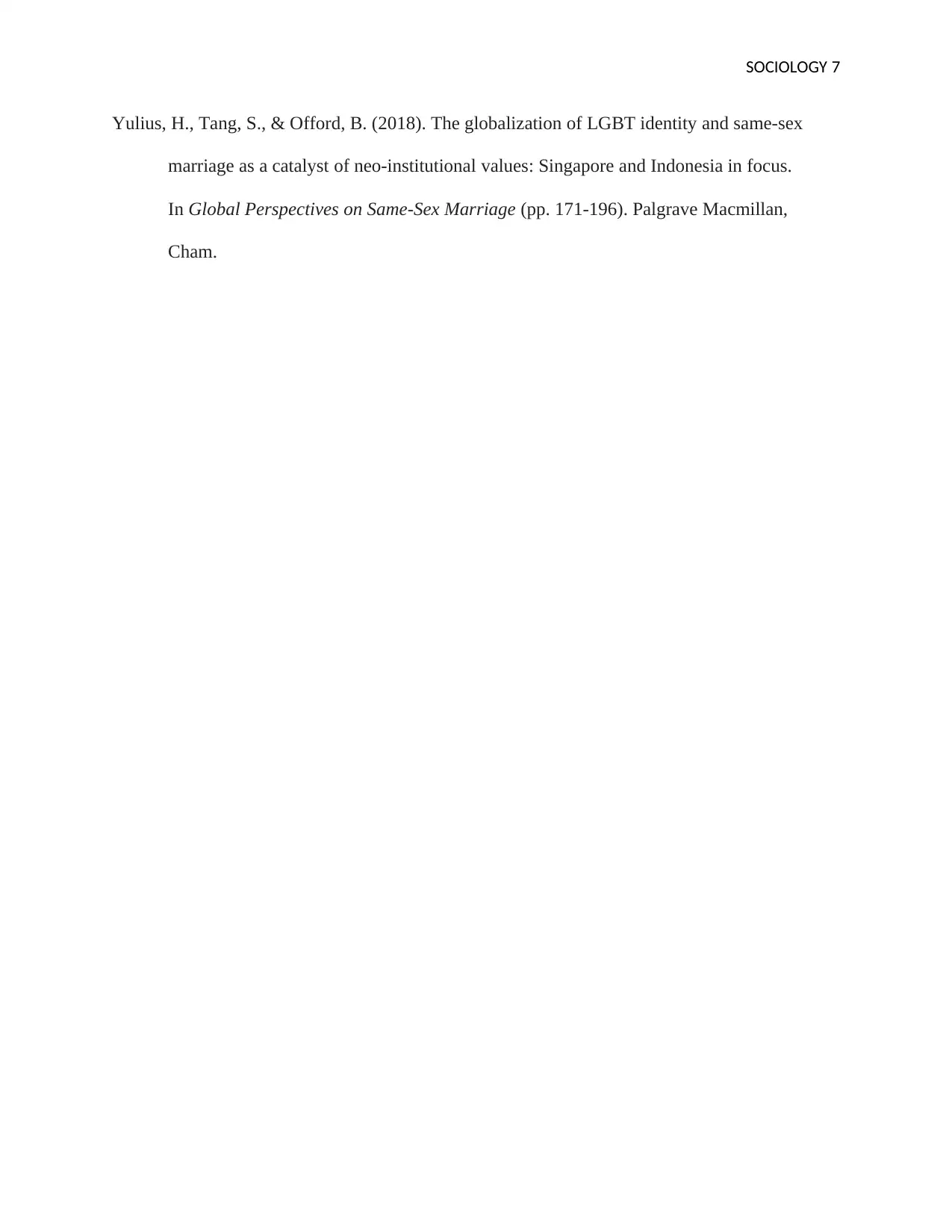
SOCIOLOGY 7
Yulius, H., Tang, S., & Offord, B. (2018). The globalization of LGBT identity and same-sex
marriage as a catalyst of neo-institutional values: Singapore and Indonesia in focus.
In Global Perspectives on Same-Sex Marriage (pp. 171-196). Palgrave Macmillan,
Cham.
Yulius, H., Tang, S., & Offord, B. (2018). The globalization of LGBT identity and same-sex
marriage as a catalyst of neo-institutional values: Singapore and Indonesia in focus.
In Global Perspectives on Same-Sex Marriage (pp. 171-196). Palgrave Macmillan,
Cham.
1 out of 7
Related Documents
Your All-in-One AI-Powered Toolkit for Academic Success.
+13062052269
info@desklib.com
Available 24*7 on WhatsApp / Email
![[object Object]](/_next/static/media/star-bottom.7253800d.svg)
Unlock your academic potential
Copyright © 2020–2026 A2Z Services. All Rights Reserved. Developed and managed by ZUCOL.





